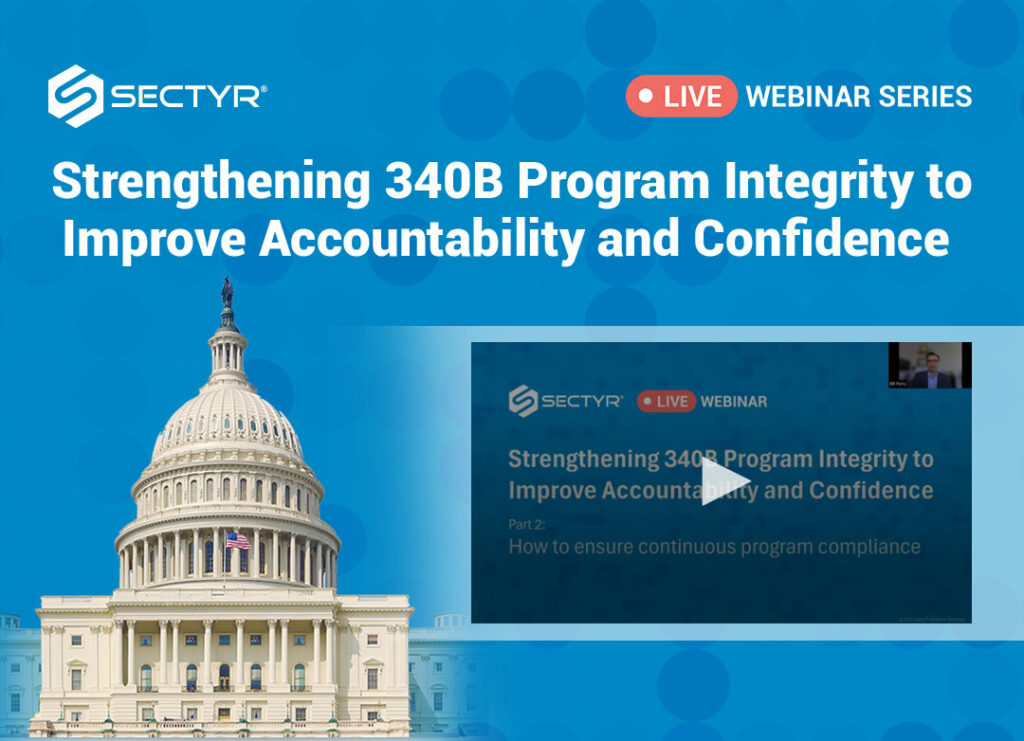For part two of Sectyr’s live webinar series focused on how to improve 340B program accountability, 340B legal expert Bill von Oehsen joined Sectyr President and COO Craig Frost in a wide-ranging discussion about the program’s past, present and future. Von Oehsen’s experience stretches back to the beginning of the 340B program, for which he played a key role in crafting the legislation to establish the program and expand the law in 2010 under the Affordable Care Act.
According to von Oehsen, the story of the 340B program has two chapters, divided by the passage of the ACA. Chapter one was educating the public and covered entities about the program. In chapter two, compliance has become paramount. Not only do covered entities now have to worry about their compliance status for audits by the U.S. Health Resources and Services Administration but also the political implications.
The future of 340B
Von Oehsen touched on four areas of compliance: the future of covered entities’ right to use contract pharmacies; the receipt of revenue through the 340B program from Medicaid, Medicare, and private payers; the definition of patient; and potential legislative reforms. Von Oehsen also offered, with caveats, several predictions of how he thought the federal courts might clarify pending questions about the contract pharmacy program. Another area von Oehsen touched on was whether covered entities would be able to continue counting on the revenue from the drug discount program.
Since the passage of the ACA, von Oehsen noted that each C-level executive must be aware of the political implications of how their organization participates in the 340B program. The locus of responsibility for 340B program compliance has moved from the pharmacy to 340B program manager and now to the C-suite.
Ensuring continual compliance
Echoing von Oehsen, Frost kicked off his part of the webinar with a quote from Apexus noting, “It’s no longer a question of whether you’ll be audited; it’s a matter of when.” Frost went on to underscore that it’s critical for C-level executives to understand the compliance framework for operating a 340B program. And they have to know they are ultimately accountable for the decisions made by their pharmacy leadership team.
To achieve the best, consistent outcomes for compliance, Frost provided an overview of the HRSA 340B Prime Vendor Program’s recommendations for a robust compliance framework and for constantly monitoring compliance to anticipate and mitigate risk. He outlined the four types of Self-Audits, as recommended by Apexus. While the annual mock audit certainly gets the most attention and most covered entities will engage a specialized audit or consulting firm to conduct them, Frost focused particular attention on the importance and key considerations of ongoing system audits.
The complexity of managing this in a manual way can eventually overwhelm a 340B program manager and staff, said Frost. So, he recommended adopting TPA-agnostic 340B compliance management software, like SectyrHub 340B, to make the process more efficient and easier. Automating compliance monitoring offers 340B program managers and the C-level team real-time visibility and one source of truth, remarked Frost.
To hear a recording with von Oehsen’s and Frost’s full comments as well as the audience Q&A from part 2 of the webinar series, “Strengthening 340B Program Integrity to Improve Accountability and Confidence,” click here now.
